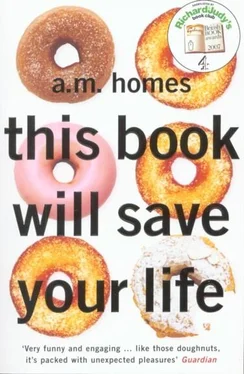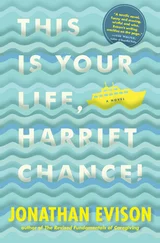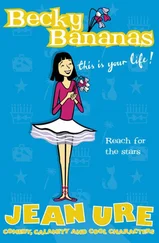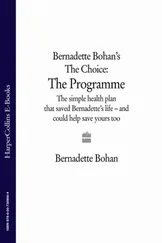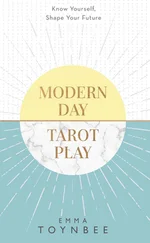Nic eats his French toast and then hooks up his IV vitamins, talking all the while.
"There was a darkness in America, and I was the wandering boy — poet, prophet, flimflam man. I came to California because, compared with the cold of upstate New York, I liked the idea of the sun always shining. I walked all the way across the country to find myself, only to then lose it again, on account of people wanting me to be something I wasn't — a guru or a leader. I was just a guy. I am just a guy."
"The guys at the pow-wow?"
"They have no idea."
"Really?"
"Yeah, how would they know? As far as they're concerned, I'm just a lucky hack."
"Do you really have a kid, and an ex?"
"Yep, and she really left me for another woman. I'm a freak but I'm not a liar. Do me a favor — pretend you don't know. You're agonizing, I can see it."
Richard pretends to change the subject. "What about the donut shop, do you think it's a good idea?"
Nic nods.
"How would it work?"
"We'd be partners, with Anhil. The three of us would sign on the lease, and then we'd take a cut of the profits."
"What's the risk/reward ratio?"
"I have no idea. It's an investment in a man; your friend Cynthia could work there, she could run it."
Richard smiles. "That's a good idea, she wants something in retail."
"Can I just ask you something?" Nic leans forward.
"Yeah, sure."
"What were you doing back then? I mean, it was a pretty active time for most people."
"I'm a little younger than you."
"Not that much. Were you completely out of touch with the rest of the world?"
"I was sheltered. We went to the beach at Cape May for two weeks and thought we were fancy."
"Weren't you afraid you were going to be drafted?"
"I'm flatfooted, wore leg braces when I was really little, metal braces, and brown orthopedic shoes."
"What was the matter with you?"
Richard shrugs. "I have no idea. And my brother is deaf in one ear," he says, puzzled, the memory just coming back to him. He shakes his head. "I didn't remember that until just now, when I said it." Richard takes off his shoes and looks at his feet — pale, very pale, hairy toe knuckles, and absolutely no arch. "Maybe that's why I was a swimmer and not a runner."
"The right leg looks a little thinner than the left in the calf," Nic says, studying his legs.
"Yeah, I know. It's always been like that." Richard puts his shoes back on. "What was I doing? I read a lot of books, biographies of people who invented things, men starting companies. I really liked Einstein and the guys who invented computers."
"I thought your brother was the inventor."
"I think I started it and then I got more interested in business. I was always setting up little companies. From the time I was about twelve, I made a profit." He stops.
Silence. Contemplation. He is distracted, going from Nic's story back into his own.
"You can't escape yourself," Nic says. "Everyone has a history."
RICHARD calls his parents; his mother answers.
"Do you remember the Vietnam War?"
"What, no 'hi, hello, how are you'? Is this a quiz show — do I get a new car for the right answer, a hundred dollars' worth of free groceries?"
"I'm just trying to piece together something. Did you and Dad ever talk about the war when I was growing up?"
"No," she says. "We didn't talk about things like that in the house — we didn't want to frighten you."
"Why would it frighten me?"
"War made your father very anxious — it was good for the insurance business, but bad for the Jews. The whole way Roosevelt handled what they called the Jewish Question — the Nazis, he knew they were killing Jews long before he did anything to stop it. There are still people — right here in our condominium complex — who say it never happened. We don't talk to them. The Vietnamese weren't our people; we were still recovering from our war." She pauses. "All I can say is that it should have ended sooner — what comes out after the fact is always interesting."
"And what about my leg and the brace? Was I born with something wrong with me?"
There is a long silence.
"You had a virus," his mother says. "And it went to your leg."
"What kind of a virus?" he asks; it makes no sense.
Another pause. "Polio. You and your brother — I was terrified that I'd lose you, both of you. I thought it was a cold, but you cried and cried like you were in a lot of pain and then had trouble with your leg. I didn't know who to blame. Your father was devastated. He wanted us to move out of the city, he said it was the city's fault for having unsanitary conditions, he wanted someone to accept responsibility. I think he felt guilty."
"And I was never Bar Mitzvahed?"
"No. You could do it now if it means something to you — you're circumcised, and that's what counts. We had a nice party for that."
"I don't remember it."
"Thank God."
"Your brother had a Bar Mitzvah," his father says, taking the phone from his mother — clearly he's been listening in. "A group Bar Mitzvah at the Reform Temple. There was a luncheon; a lot of people got sick from the egg salad — there was something wrong with the mayonnaise, it had turned. Since when are you so religious?"
"I'm not. I'm just trying to remember things."
"History changes, you can't hold on to anything."
HE HANGS UP thinking about his parents' getting old, how much is already lost, how he'll never get it back. He thinks about how long he's kept away from them, as if protecting himself, but they're not who they were, the secrets they were keeping are already gone — they don't remember what they forgot to tell him.
IN THE MORNING he gets a call from the contractor. "We had to quit work on the house — you've got a colony of fire ants living there; a couple of the guys got stung. I only hope they don't sue."
"For what?"
"They could claim you knew the colony was there."
"What colony! I don't even know what you're talking about."
"Look, get an exterminator — that's the first thing you need to do — and then, when they say it's safe, call me back. There's no hurry."
"There is a hurry — it's my house, it's in pieces."
Fire ants — he imagines a colony of little ants dressed in firemen's garb, heavy coats, hard hats. He pictures red ants in native wear — kind of Hawaiian, or like tribesmen of New Guinea — dancing around a fire they made with a piece of old broken bottle glass and a dry leaf, sending smoke signals to other colonies up and down the coast, celebrating a sting.
He calls six exterminators before he finds one that deals with fire ants; he gets that guy's name from his insurance agent — Paul, the stoner, who asks, "Are we ever going to meet in person or is this it — these random, impersonal phone calls?"
"I have no idea," Richard says. "Do you exist in reality?"
"Yes. Next time I suggest you stop by the office." Paul's voice is high and thin; Richard imagines him as enormously tall and long, like a California tree.
AT THE END of his next session, Sydney, the Gyrotonics instructor, asks him out. They go to dinner, they go dancing. She invites him back to her place. "If you don't like my peaches please don't shake my tree," she sings. "There's something I should tell you," she says. "I have only one breast."
"That's OK," he says, thinking that it's somehow genetic, in the way that a guy can have only one nut.
"I had cancer."
He nods.
"I had surgery."
He nods again.
"So — I have only one breast. I haven't done this in a long time." She pauses. "I thought you should know."
"Neither have I," he says.
"Not since then," she says.
"Are you all right?" he asks.
"I'm fine."
He holds her. They stay like that, standing, holding, for a long time. They kiss. She is a good kisser. He's not sure he ever liked kissing before, but her mouth tastes good, feels good. The wetness of her mouth, the briskness of her tongue catch him off guard. He feels a rush of blood, hot and cold, terror and desire. Enveloped in the heat of her body, her scent, foreign, unfamiliar, reminds him of how much he liked the smell of his wife. How when he left her he took her perfume, and every now and then would spray a little, getting a dose, a fix of her.
Читать дальше
